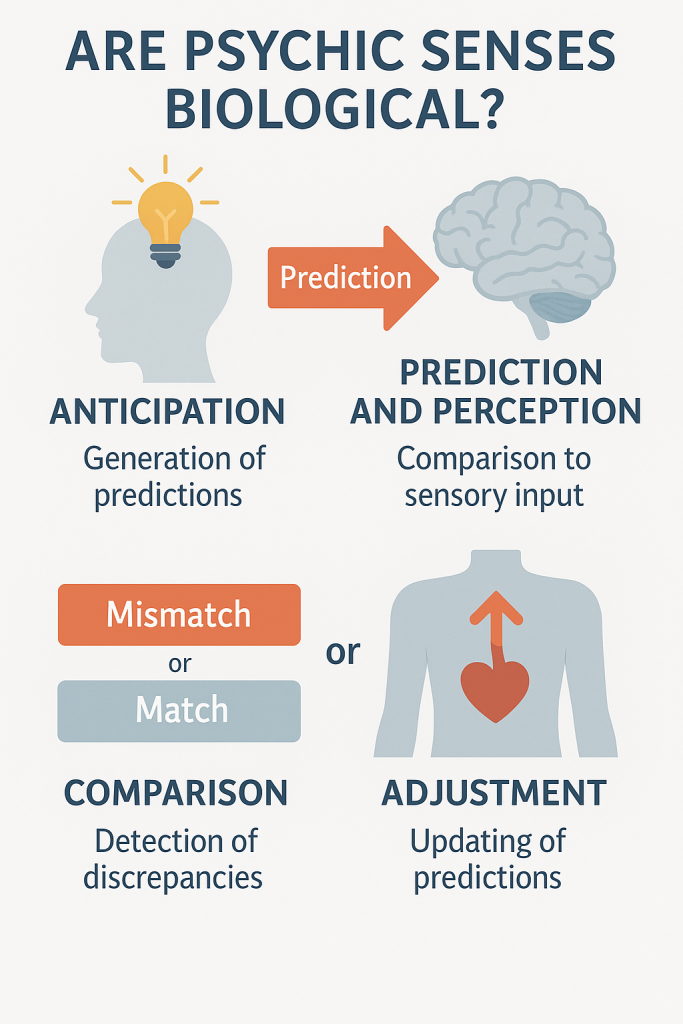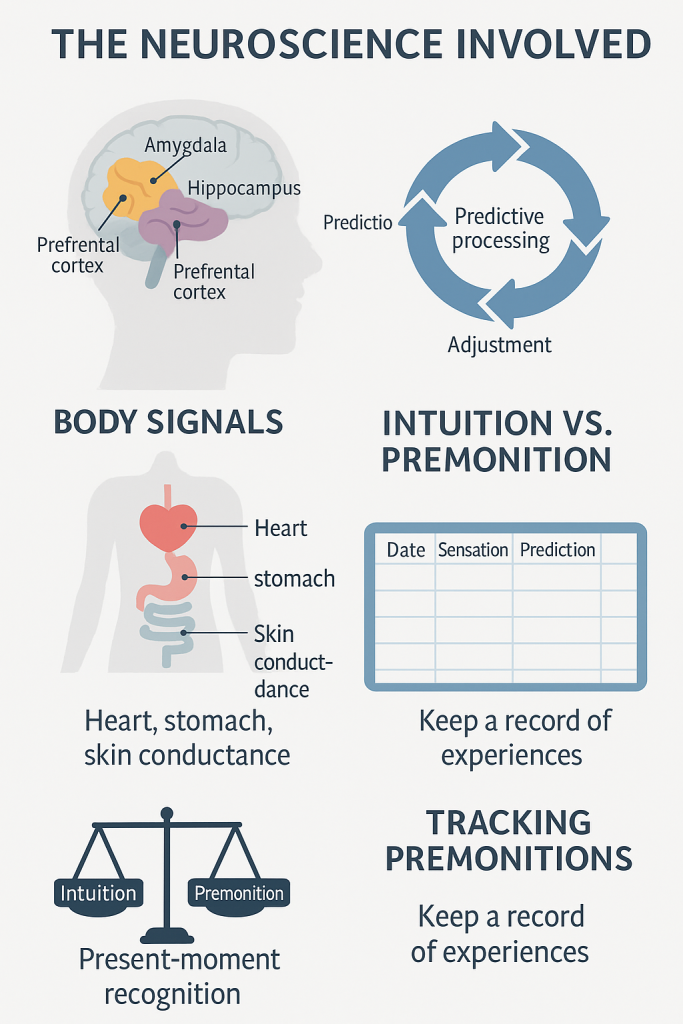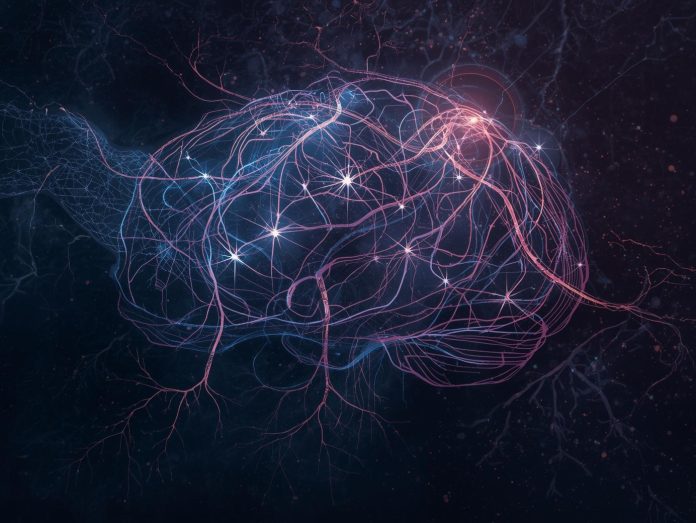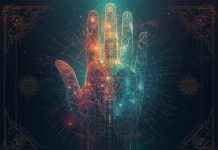Knowing Things Before They Happen
Almost everyone has had a deep feeling in their gut before bad news comes, or an urge to call someone, and then their name lights up on your phone, or a dream that is so vivid that later on in life, you see the dream come true. These are times that are hidden inside of you, but they later come out, and this is what a premonition is. There are many skeptics who say that these situations are just coincidences, but those who believe say that this is all a part of psychic awareness. But the truth is, what if the skeptics and the believers are all missing the point? What if premonitions aren’t magic, but they’re part of our biological makeup?
Neuroscience talks about framing the brain not as a passive receiver in our world, but as a way to make predictions, constantly modeling what is supposed to happen next. This makes us ask the question: Are our psychic senses actually natural to the predictive process? Another way to say this is: Are the premonitions that we have biological voices of the future that our brains are already getting ready for?
As you read on, you’ll see that this article talks about science and how premonitions work. We’ll look at predictive neuroscience, examine experiments, and decide whether psychic senses are part of physiology. We’ll ask if premonitions are real but also try to find out what they mean for our lives, how we decide things, and how we trust our own intuition.

Understanding the Terms Premonitions, Precognition, and Presentiment
When looking at these things, it’s important to understand these terms:
Premonition
This is a feeling that something is going to happen that follows an emotion. It happens when someone feels uneasy before a phone call or a knock on the door, or it could be déjà vu that feels like it’s warning you against something.
Precognition
This is the perception of future events before they happen, without interference. An example of this is dreaming of something and then having the dream come to life.
Presentiment
This is a scientific term that is used in research. It is the measurable physiological changes, like how the heart rate increases or when someone gets sweaty, that happen right before an unpredictable event. According to Frontiers in Psychology, researchers have tested these things with randomized images, flashes, or sound bursts, to find how the body reacts before a stimulus appears.
These words are all different depending on culture, science, and spirituality, but they all show us that people have the same kind of experiences of knowing, or at least feeling something, before reason and logic say that we should.
The Brain as a Prediction Machine
Neuroscience sees the brain less like a camera that records reality and more like a fortune teller. This is known as predictive processing or predictive coding. According to PMC, instead of your brain waiting for information from the world, your brain generates its own models of what it thinks will happen next, then updates the predictions when reality disagrees.
When you play baseball, for example, by the time your eyes see the ball, your brain already knows where it’s going to land. Without this predictive processing, you would never be able to catch it because you’d always be late. The same mechanism shows why you will flinch before a glass breaks or why a familiar song lyric will pop into your head before you sing it.
Of course, here’s what happens with an overlap when it comes to premonitions. If the brain is always looking for signs of the immediate future, what happens when the simulations go further than we realize? Do gut feelings and psychic feelings mean it’s a byproduct of biological forecasting?
Some scientists believe that premonitions might happen as a result of overfitting, which is when our brains pick up on subtle cues that we don’t process consciously and then make us aware by projection. Others think that prediction is so deeply wired in our brains that sometimes it produces signals that make us feel like we are looking into the future.
When looking at this from a spiritual perspective, this doesn’t disprove that someone has psychic senses but supports the idea. It shows us that our biology might be tuned in to anticipate more than we consciously know. What someone might call foresight, neuroscience calls prediction. Both are describing the same situation from different perspectives.
Psychological Evidence That Premonitions Are More Than a Coincidence

Now that we know that premonitions are more than just a coincidence, the body should be showing signs before the brain does. This is what many different experiments suggest.
Researchers have been studying this for a long time, and some have conducted studies that measured skin conductance, pupil dilation, heart rate, and brain waves in people who were shown different sequences of images. Some of them were neutral, some were emotionally disturbing. The thing is that the images were randomized by a computer in real time so that it was impossible for the volunteers to predict what image was coming next. However, in different studies, it was shown that the participants’ bodies would show an anticipatory shift seconds before the emotional images appeared. Their skin conductance increased, their heart rate became more rapid, and their body prepared for what was coming. This is called predictive anticipatory activity or PAA.
One study in 2012 was a meta-analysis of presentiment that found a small but consistent effect in the experiment that people’s physiology seemed to be able to anticipate future stimuli that was beyond chance, according to Frontiers in Psychology. The author of this study said that while replication challenges are still there, the data show that humans might have a subtle ability to feel the future in a biological sense.
Of course, not everyone is going to agree, and critics say that statistical biases, such as expectancy effects, or even methods that are flawed, could explain why this is happening, according to Frontiers in Human Neuroscience. But even skeptics have to admit that the patterns are interesting, especially when this study has been done in so many labs with the same results.
Those who believe in psychic phenomena believe that presentiment research shows that science is finally in agreement. But for skeptics, they want a better explanation beyond psychic gifts. Either way, the studies show that our bodies might know more than our conscious mind does, and biology shows what cultures have been calling premonition for centuries.
Personality, Cognitive Traits, and Intuition
Some might wonder why some people have more premonitions than others. According to neuroscience and psychology, the answers lie in the differences between individuals, their cognitive styles, emotional wiring, and even their personalities.
Research has shown that people who score high in absorption (the tendency to become deeply immersed in feelings, thoughts, or imagination) have more psychic-like experiences than others. Those who are high in openness to experience and emotional sensitivity also talk about having more intuitive hunches. These are the traits that make the mind more open to subtle cues that can manifest premonitions.
In Frontiers in Psychology, research found that believing in psychic phenomena works with different thinking styles. People who believe in intuitive reasoning are more likely to accept that what happens to them is a premonition, but those who believe more in analytical reasoning are more dismissive of them. This doesn’t mean that those who are skeptical don’t experience premonitions, but that they interpret them as logic instead.
Emotional intelligence can also be part of this. People who are able to read emotional signals in others often feel that they know about upcoming events. This could be that their social perception is higher, and it helps them to tune into patterns that other people might miss, when it feels like psychic foresight.
When looking at it from a spiritual perspective, this shows that everyone has psychic potential, but some are more tuned into them than others. Just like a person who has musical talent, some people are born prodigies, while others have to train and learn to play their songs in tune. Psychic sensitivity might be a mix of innate disposition and even practice.
This might suggest that premonitions aren’t just random gifts that a few people have, but they might be part of a natural spectrum of human awareness that is increased by personality, experience, and being open to intuition.
How Biology and Psychic Phenomena Work Together
If premonitions are really real, then how can they be explained biologically? Science doesn’t have the answer, but there are different hypotheses that show how psychic senses can fit into the brain and body models.
Predictive coding in neuroscience is one idea. This shows us that the brain doesn’t just react to what is happening around it, but it constantly forecasts what might happen. Some researchers believe that someone who is extremely sensitive to their environment might pick up cues that allow them to make predictions that might even feel paranormal. PMC suggests that when someone sees a subtle change in posture, expressions, or even shifts in the weather, it could register to them unconsciously, and when combined with reality, it can create a sense of knowing before the event ever happens.
Retrocausal theories, like the idea that information from the future can influence the present at a quantum or neural level, are another study. Even though this isn’t proven, studies of anticipated synchronization in neural networks say that under certain conditions, one of the systems can act as though it has access to signals that are ahead of time, according to arXiv. Even though this doesn’t prove psychic senses really exist, it does open the door for more research on how time and perception might not be as linear as people have said.
The autonomic nervous system is another study. Presentiment studies show that changes in skin conductance and heart rate a few seconds before an unpredictable stimulus might happen, according to Frontiers in Psychology. This suggests that our bodies might be able to sense what is going to happen so that they can prepare for events that our conscious mind can’t explain.
Of course, skeptics will argue that these are just effects of statistical noise, but the results that are seen throughout different labs keep people researching and guessing. Believers say that science is actually confirming psychic awareness.
These different hypotheses can suggest that the things that we call premonitions don’t live just in the spiritual world, but that they are part of biology. It is something that might need to be explored more, just like predictive, adaptive, and intuitive systems that keep people alive.
Dreams and Other Predictive Ideas
One of the most well-known ways that people have premonitions is through dreams. Even Abraham Lincoln dreamed of his own assassination, and so do other people. There are stories of dreams that turn into reality that have been reported for years and years. But how does this work with neuroscience?
The Hidden Cues Hypothesis is one explanation of this. The brain is always picking up new information that a person doesn’t consciously process. This might be a conversation that they heard, a shift in someone’s health, or background details that we don’t know we notice. When sleeping, the brain will replay these things and recognize and reorganize the information. Sometimes it will take different fragments of this information and put them into dreams that look prophetic when they align with the events that happen later.
But there are still some dream premonitions that aren’t easily explained. Studies that look at precognitive dreams have found that there are a large number of people who report having at least one dream that seemed to tell the future, according to Sleep Foundation. In different surveys, people talk about dreaming of anticipated natural disasters to seeing car accidents that involved their loved ones.
Symbols also play a big part in dreams. Dreams are often conditioned metaphorically. Dreaming of a tidal wave might not mean that a flood is coming, but might foreshadow a wave of emotions or a major change in life. The way dreams blend symbols and literal content makes dreams a place for psychological and psychic interpretation.
When looking at dreams in a neuroscientific way, the dreams might be telling possible futures. They allow people to rehearse the outcomes before they ever happen, just like an athlete will imagine their performance before they start. When looking at it from a spiritual viewpoint, dreams are like portals that open up the boundary between the conscious mind and the intuition.
While some see this as biology, others will see it as prophecy. But the truth is that premonition dreams show us that our minds can tell stories by reaching into tomorrow, just as they can replay what happened yesterday.
Real-Life Examples of Premonition
All through history, there have been different cases of premonition. Some of them are so interesting that people have a hard time deciding if it’s a coincidence or if it’s a mystery. Here are some real-life examples that fuel both skepticism and belief.
The Aberfan mining disaster that happened in Wales in 1966 is one of the most well-known examples. A coal tip collapsed onto a school, killing 144 people, with most of them being children. Psychiatrist John Barker talked about different people who had reported dreams or warnings about this happening before it did. Some of the children even told their parents or teachers about their dark dreams that showed black waves of debris flying. According to The New Republic, Barker published these accounts, and it sparked the question of whether premonitions were real or fake.
There are everyday people who describe having gut feelings before an accident happens. Someone might decide at the last minute to take a different route to work, for example, only to find out later that a crash happened there. Sometimes people dismiss this as a coincidence, but the emotional weight that they had makes sense for those who have experienced it.
Ganzfeld studies, which are parapsychology experiments, have tried to look for psychic perception when someone was under controlled conditions. According to Wikipedia, Ganzfeld experiment, participants who were in a sensory-reduction environment often reported having feelings that align with remote targets at a higher rate more than chance. These findings suggest that even though the measurable channels are weak, they still have non-local information transfer.
Even people who are known, like Mark Twain, claimed to have premonition dreams. Mark Twain said he had a dream of his brother’s death before it happened. He was able to even describe the funeral in detail. Abraham Lincoln reportedly said that he had a dream of his own assassination before he was killed at Ford’s Theatre.
Skeptics might argue that these stories are more about mystics than hindsight. Believers say, though, that there are so many people who have these accounts that it can’t be dismissed. These examples make people curious and remind them that human perception goes beyond science.
Why People Keep Believing
Even though premonitions are debated, many people still believe in them. This might be because it’s less about data and more about psychology and the need that humans have for meaning.
Premonitions give people a sense of control when there is chaos. When people feel uncertain, our bodies and minds can help us to see danger ahead, and this is comforting. It shows us that we aren’t just pawns or randoms but that we have the universe to help guide and protect us.
This also gives coherence. When something bad happens, people talk about dreams that they had leading up to the things that happened. These are memories that are shaped by hindsight, even if they aren’t completely accurate. They help people to understand the tragedy of the story. People like to tell stories, and they would rather believe that they sensed something was going to happen instead of accepting that it was by coincidence.
When looking at this from a cultural perspective, every society has its own traditions based on dreams, prophets, and seers. This shows that premonitions aren’t just cultural myths, but they are part of human experience. Even modern neuroscience shows us that these things that happen are more than just beliefs, but they are something that is built inside of us.
Believing in premonition brings hope. It shows that the future isn’t always about chaos, but that you can get the warnings, signals, and opportunities ahead of time. For many people, this is empowering, especially when times are uncertain.
Some call this biology, psychic abilities, or just coincidence, but premonitions help us move on because they show the core of human need. Humans need to know that life isn’t always unpredictable and that we can look into the future.
Strengthening Your Spiritual Practices
If there’s even a bit of truth to the idea that premonitions have roots in how our minds and bodies work, then it makes sense that we can learn to notice them better. Whether you see this through a scientific or spiritual lens, the key is awareness and balance.
- Keep a Journal for Hunches
Whenever you get a gut feeling, vivid dream, or quiet nudge of “knowing,” write it down right away. Later, see if any of them lined up with real events. Over time, you’ll start noticing which feelings seem random and which carry weight. Keeping notes helps you stay honest, but it’s easy to remember the hits and forget the misses otherwise. - Make Space for Stillness
Premonitions tend to whisper. Meditation or even simple mindfulness slows your thoughts so you can pick up on the subtle cues you might normally ignore. Research shows meditation can sharpen awareness of the body’s quiet signals, something that might help you catch those “ahead of time” sensations more clearly. - Notice Your Body’s Language
Your body sometimes reacts before your mind catches up. Maybe your stomach flips before bad news, or your chest feels heavy before a difficult call. Instead of brushing those off, take note. They could be your nervous system giving you a quiet heads-up. - Play with Small Predictions
Treat it like practice, not pressure. Guess who’s texting before you check your phone? See if you can sense what kind of mood an email holds before opening it. Whether or not it’s psychic, you’ll start noticing patterns, and your intuition will get sharper with use. - Choose Guides You Trust
If you ever work with a psychic or medium, pick one who encourages independence. A good reader won’t claim to have all the answers, but they’ll help you connect the dots yourself. Use their insight as inspiration, not instruction.
These steps won’t make you a fortune-teller, but they can help you tune in to your instincts. Think of intuition as another kind of intelligence, one that bridges what your mind observes, what your body feels, and what your spirit already knows.
Final Thoughts: Bridging the Mysterious with Biology
Premonition mixes both science and spirit. Neuroscience shows us that the brain is able to make predictions and is always running simulations of what might happen next. Then there are the human stories that say that their experiences of knowing before something happens are real. The question is, are psychic senses a gift or are they part of biology?
Prediction processing degrees, presentiment studies, and even the physiology of dreams show that our bodies might anticipate more than we even realize. Skeptics often call this bias and statistical noise, but those who believe show that there have been people who have lived these experiences – it’s too precise to call it a coincidence. Maybe the truth is that psychic sensitivity is a spectrum that is part psychological, part biological, and part mystery.
But the real power of premonition is that it shows us that the more aware we are, the wider our conscious thoughts are. Premonitions tell us to listen to our gut feelings and to honor the dreams that give us information and symbols. It tells us to trust our intuition as wisdom and not weakness. Whether you decide that this is psychic foresight or predictive biology, the message remains the same: the future might not be as quiet as people think it is.
The next time that you get that dream, have a chill go down your spine, or have a gut feeling. Take time to pause. Listen to your body and your mind, and maybe you’ll learn something even larger about tomorrow in today.
FAQ: Premonitions & Neuroscience
What is a premonition in scientific terms?
A premonition is a felt sense or impression of a future event, often described as anticipatory awareness before objective evidence appears.Are premonitions the same as intuition?
Premonitions are a subtype of intuition focused on the future; intuition can also cover present-moment pattern recognition.How might the brain generate a premonition?
The brain may integrate weak signals from memory, interoception, and environmental patterns to forecast likely outcomes before we’re consciously aware.What brain regions are most discussed?
The insula (interoception), amygdala (salience), hippocampus (memory), and prefrontal cortex (prediction and control) are frequently implicated.Do bodily signals matter?
Yes. Heart rate variability, gut sensations, and micro-changes in skin conductance can flag salient changes before conscious recognition.What is predictive processing and how is it relevant?
Predictive processing is the theory that the brain constantly generates predictions; “hits” that later match reality may be experienced as premonitions.Can dreams carry premonitory content?
Some people report dreams that later align with events; these may reflect off-line memory consolidation plus pattern-based forecasting.Are premonitions just confirmation bias?
Bias plays a role, but not all experiences can be dismissed; rigorous documentation helps separate chance from meaningful signal.Is there evidence of anticipatory physiology?
Some studies report small pre-stimulus physiological shifts; results are debated and call for preregistered, high-powered replications.How can I responsibly test my own premonitions?
Write them down before events occur, use timestamps, be specific, and review outcomes periodically to calculate real hit rates.Could trauma heighten premonitions?
Heightened vigilance can sensitize salience networks, making pattern-detection feel premonitory; therapeutic support is recommended.Do gifted psychics experience different brain activity?
Small studies suggest differences in attention and interoception, but large, controlled research is still limited.Are there ethical concerns in acting on premonitions?
Yes. Avoid causing harm; consider proportional, low-risk actions and seek corroborating evidence when stakes are high.Can technology help measure premonitions?
Wearables tracking HRV, sleep, and EDA can capture time-locked physiology around reported impressions for later analysis.What role does emotion play?
Emotion tags predictions with urgency; strong affect can amplify salience, for better or worse.How do I reduce false alarms?
Define criteria for action, require a minimum confidence level, and cross-check with external data or trusted advisors.Are there cultural differences in interpreting premonitions?
Yes. Many cultures normalize forewarning experiences, which can shape how people notice and report them.Can meditation improve accuracy?
Practices that calm noise and increase interoceptive clarity may improve signal-to-noise, though results vary by individual.What is the difference between anxiety and a true premonition?
Anxiety is persistent, diffuse, and internally driven; a premonition is often brief, specific, and context-linked with a later match.How can this topic be researched ethically?
Use transparent preregistration, protect participant well-being, and report null results to avoid publication bias.





Honestly, this was super eye-opening! 😍 I never knew that there were actual studies showing our bodies react BEFORE stuff happens. I always thought it was just vibes or being paranoid, but now it makes sense!
I didn’t understand half of this but I think it’s saying your brain knows stuff before you do??? That’s kind of scary tbh 😳
This article brilliantly blends neuroscience and spiritual insight to explain premonitions. The theory that predictive processing underlies what we call psychic ability is fascinating. It’s a refreshing, intelligent take on something usually dismissed.
I agree! I’ve always felt like my dreams meant more than just random stories. This article helped me connect the dots with how our brains work in prediction. Super insightful! ✨
The idea that emotional intelligence enhances premonitions makes so much sense to me personally. As someone who’s highly empathic, I often feel things coming before they happen.
“Yes! I’m exactly the same way! Empathy really does make you feel more tuned in to people and events ahead of time—like your heart is a radar or something.”
“Interesting hypothesis about retrocausality influencing present neural states… but let’s not forget Occam’s razor here. Anecdotal reports don’t qualify as empirical evidence no matter how emotionally compelling they are.”
So you’re telling me my weird dreams about zombie cats could be biological foresight? Nah, bro. Sounds like science just wants to rebrand fortune-telling as ‘predictive coding.’ Next they’ll call horoscopes quantum psychology.
Having studied psychophysiology for years, this article does a great job balancing scientific studies with anecdotal evidence—especially the part on presentiment and emotional reactivity before stimuli.
“Predictive anticipatory activity” sounds like a fancy way of saying we get lucky guesses sometimes. Not buying it until someone predicts the lottery numbers with their sweaty palms and dilated pupils. 🙄
Okay but if my brain can predict things like traffic accidents or emotional phone calls, why can’t it ever predict when I’m going to lose my keys? Come on, predictive processing—do better 😂
Seriously though… this whole thing reads like a TED Talk mated with a horoscope column.
But isn’t that kinda the point? That both sides are maybe describing the same experience from different angles?
Exactly what I thought! Half science class, half crystal ball reading.